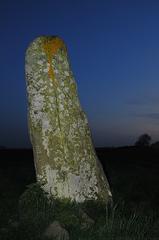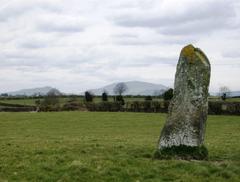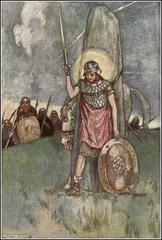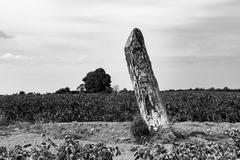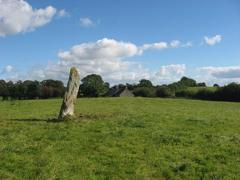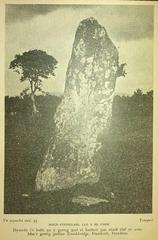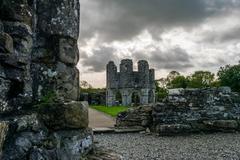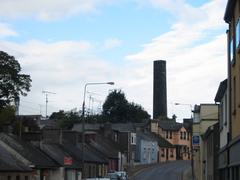
Visiting Clochafarmore: History, Tickets, and Tips
Date: 01/08/2024
Discover Clochafarmore: An Overview
Clochafarmore, nestled in the heart of Drumcondra, Ireland, is more than just a standing stone; it is a symbol of Ireland’s storied past and rich cultural heritage. This ancient monument, standing at approximately 3 meters, is famously associated with the legendary Irish hero, Cú Chulainn. According to folklore, Cú Chulainn tied himself to this stone to die standing after being mortally wounded in battle, an act of bravery that has immortalized Clochafarmore in Irish mythology (Irish American Mom). The stone’s significance is further highlighted in the Dindsenchas manuscripts, which delve into early Irish topography and place names (Voices from the Dawn).
Clochafarmore’s allure is not limited to its mythological connections. Archaeological discoveries in the 1920s, including an ancient bronze spearhead found near the site, suggest that this area may have been a significant battleground in ancient times, adding a layer of historical intrigue (Voices from the Dawn). Today, Clochafarmore stands as a testament to Ireland’s rich tapestry of history and legend, drawing visitors from around the world who are eager to explore its storied past and the picturesque landscapes of Drumcondra.
Contents
- Introduction
- Historical Background
- Early Medieval Significance
- The Dindsenchas Manuscripts
- Archaeological Discoveries
- Visitor Information
- Visiting Hours and Tickets
- Travel Tips
- Nearby Attractions
- National Botanic Gardens
- Croke Park
- Drumcondra Castle
- Accessibility
- Special Events and Guided Tours
- Photographic Spots
- The Role of St. Helena
- Drumcondra’s Evolution and Integration into Municipal Dublin
- Rediscovery of Local Identity
- Cultural and Historical Preservation
- FAQ
- Conclusion
Introduction
Clochafarmore, located in Drumcondra, Ireland, is a site rich in historical significance and folklore. Known for its association with the legendary Irish hero Cú Chulainn, this standing stone offers a glimpse into Ireland’s ancient past. Whether you’re a history enthusiast, a cultural explorer, or simply curious, Clochafarmore and its surroundings have much to offer.
Historical Background
Early Medieval Significance
Clochafarmore is deeply rooted in early medieval history. The stone is famously linked to Cú Chulainn, who, according to legend, tied himself to this stone to die standing after being mortally wounded in battle. This act of bravery has immortalized Clochafarmore in Irish folklore (Irish American Mom).
The Dindsenchas Manuscripts
The Dindsenchas manuscripts highlight Clochafarmore’s importance in Irish literature and culture. These manuscripts, which explain place names, reflect the early Irish writers’ fascination with topography (Voices from the Dawn).
Archaeological Discoveries
In the 1920s, an ancient bronze spearhead was discovered near Clochafarmore, suggesting the area may have been a significant battleground in ancient times. Although the artifact was lost, its discovery adds an archaeological layer to the site’s historical narrative (Voices from the Dawn).
Visitor Information
Visiting Hours and Tickets
Clochafarmore is accessible year-round. While there is no formal ticketing system in place, it’s advisable to check local resources for any updates regarding visiting hours and any potential entry fees.
Travel Tips
- Getting There: Drumcondra is easily accessible via public transport from Dublin. The area is well-connected by bus and train services.
- Best Time to Visit: Spring and summer months offer the best weather for exploring the site.
- What to Bring: Comfortable walking shoes and a camera to capture the scenic beauty and historical landmarks.
Nearby Attractions
- National Botanic Gardens: A serene escape with beautifully curated gardens, located just a short distance from Clochafarmore.
- Croke Park: Ireland’s largest stadium, offering tours that delve into the history of Gaelic games.
- Drumcondra Castle: Explore the historical architecture and lush gardens of this nearby landmark.
Accessibility
Clochafarmore is relatively accessible, though the terrain can be uneven. Visitors with mobility issues might find some areas challenging. There are no dedicated facilities for disabled visitors, so plan accordingly.
Special Events and Guided Tours
While there are no regular guided tours, local historical societies occasionally organize events and tours. Keep an eye on local bulletin boards or community websites for announcements.
Photographic Spots
Clochafarmore itself is a stunning photographic subject, especially during sunrise or sunset. Nearby landscapes and historical landmarks also offer excellent photo opportunities.
The Role of St. Helena
In early medieval Ireland, authors of place-name stories might have traveled the countryside, much like St. Helena did in the Holy Land, to associate specific locations with legendary events (Voices from the Dawn).
Drumcondra’s Evolution and Integration into Municipal Dublin
Drumcondra has transformed from a rural village into a vibrant suburb of Dublin. By 1900, it was integrated into the municipal area of Dublin to address urban challenges, marking a significant shift in its administrative and social landscape (Irish Times).
Rediscovery of Local Identity
Recently, there has been a resurgence of interest in Drumcondra’s historical and cultural identity, fueled by local residents exploring their neighborhoods during lockdowns (Irish Times).
Cultural and Historical Preservation
Efforts to preserve and promote the historical significance of Clochafarmore continue, ensuring that the stories and landmarks associated with it remain accessible to future generations (Irish American Mom).
FAQ
Q: What are the visiting hours for Clochafarmore?
A: Clochafarmore is accessible year-round, but it’s advisable to check local resources for any updates.
Q: Is there an entry fee for Clochafarmore?
A: There is no formal ticketing system currently in place.
Q: How can I get to Drumcondra?
A: Drumcondra is well-connected to Dublin via public transport, including bus and train services.
Q: Are there guided tours available?
A: While there are no regular guided tours, local historical societies occasionally organize events and tours.
Conclusion
Clochafarmore and Drumcondra offer a rich tapestry of history and legend. From the heroic tales of Cú Chulainn to the area’s integration into modern Dublin, visitors can witness a piece of Ireland’s past and appreciate ongoing efforts to preserve this heritage. Plan your visit to explore the historical insights, enjoy nearby attractions, and immerse yourself in the cultural significance of this remarkable site.
